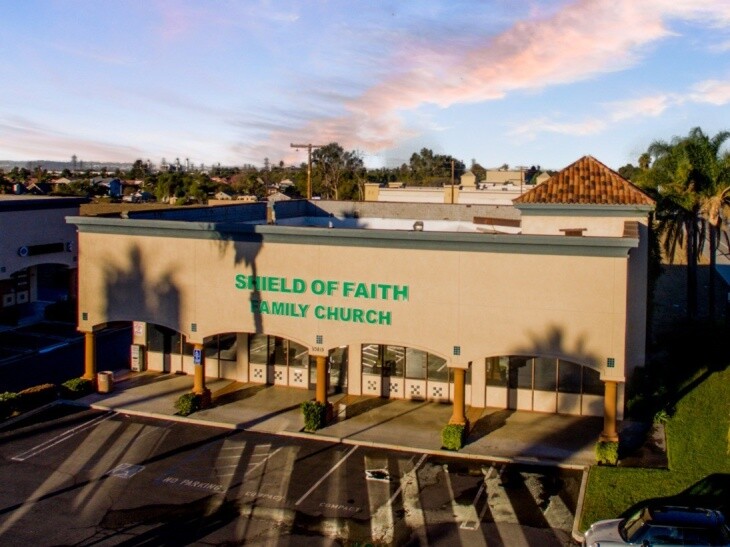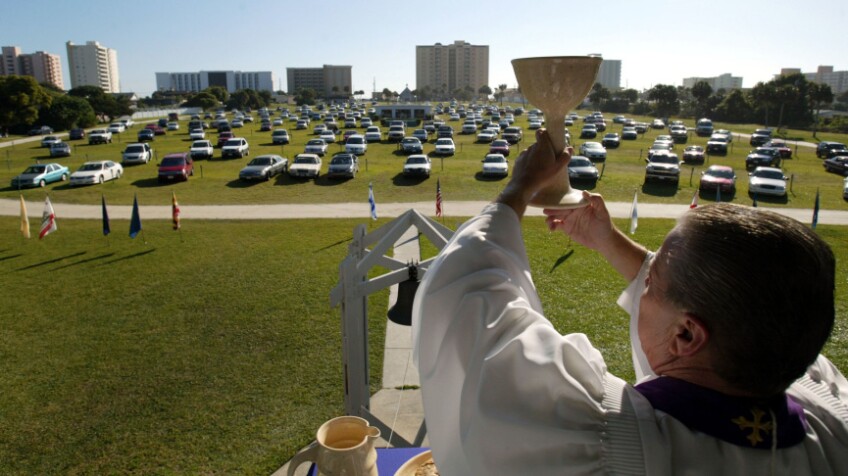California Churches Sue State and Counties Over Social-Distancing Orders
The following article was originally published April 14, 2020, and republished through a collaboration with KPCC and LAist.
Story by Aaron Schrank
Three Southern California churches that want to keep holding in-person services during the coronavirus outbreak sued Governor Gavin Newsom and other officials on Monday.
The suit, filed in the federal court for the Central District of California, challenges stay-at-home orders issued in the state of California, and in San Bernardino and Riverside counties. None of those orders list houses of worship as critical infrastructure, where people are allowed to meet face to face.
"We're here on behalf of people who wish to worship in a socially responsible way and don't feel that the government has any right to treat them differently or put their rights in a second-class citizen category compared with people who wish to eat," said Harmeet Dhillon, a California attorney representing the churches.
The churches listed as plaintiffs in the lawsuit include Church Unlimited in Indio, Word of Life Ministries International in Riverside and Shield of Faith Family Church in Fontana.
"Liquor stores are open. Dispensaries are open, but the church has to be closed. I don't see the rhyme or reason for that," said Patrick Scales, head pastor at Shield of Faith Family Church. "How can I be a pastor and lock up the doors of the church? For me, that's contradictory to what the gospel says or what our core beliefs are."

Scales' church did open its doors on Easter Sunday. He says about 50 people attended a worship service, all wearing masks and sitting six feet apart.
"When people come into our church, the first thing they'll see is people with facemask, gloves and hand sanitizer," Scales said. "We are complying. We're not trying to purposely defy the law or the recommendations."
Scales and the other plaintiffs argue that churches provide services in high demand, and that scripture commands them to keep their doors open.
Another plaintiff, James Dean Moffat at Church Unlimited in Indio, was fined $1,000 for violating Riverside County's order by holding a Palm Sunday service earlier this month, according to the lawsuit.
The complaint cites the 1993 U.S. Supreme Court case Church of the Lukumi Babalu Aye v. City of Hialeah, in which justices held that "a law burdening religious practice that is not neutral or not of general application must undergo the most rigorous of scrutiny."
While some legal scholars say the suit has merit, USC Gould School of Law professor Nomi Stolzenberg, who teaches a course on the religion clauses of the First Amendment, told us it's based on a distortion of the meaning of religious liberty and free exercise of religion guaranteed in the Constitution:
"The central claim upon which this entire complaint rests is that the regulations that are being challenged are not neutral, are not general, and do not apply to all people equally, but that they actually target religion."
In Stolzenberg's view, the stay-at-home orders are textbook examples of laws that are both neutral and generally applied, and therefore not subject to strict scrutiny.
But the lawsuit argues that the orders are discriminatory because certain businesses can get exemptions while churches cannot.
Stolzenberg says that's a tough argument to make, but she acknowledges that there's some case-law behind the plaintiffs' suit. Stolzenberg characterized the lawsuit as being part of decades-long conservative legal movement to reinterpret the idea of religious liberty under the free exercise clause of the First Amendment.
Even if the plaintiffs could make the case that they're being singled out, Stolzenberg says there's also judicial deference to extraordinary circumstances like a global pandemic.
"The Court has always recognized that during a state of emergency, the ordinary rules don't apply," Stolzenberg said.

Stolzenberg said it's a travesty that public officials have to devote any time and resources to dealing with the lawsuit.
"The only good thing about this case being filed is that it might finally demonstrate the fallacies on which this conception of religious liberty rests, and the need to repudiate it and restore some sense to First Amendment doctrine," said Stolzenberg.
State and county officials say they've received the lawsuit, but declined to comment on ongoing litigation.
Very few churches in California have refused to stop holding in-person services. But on Easter Sunday, several churches held drive-in services.
Meanwhile, states have taken different approaches to churches in social distancing guidelines, with some providing some kind of exemption for religious activity.
California officials have reported more than 24,000 cases of COVID-19 and nearly 750 deaths.



